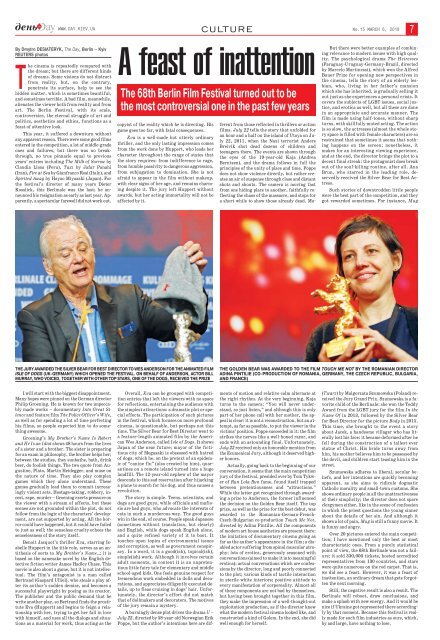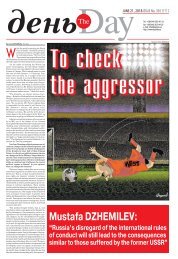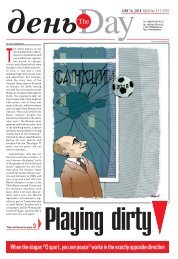#15_1-8
You also want an ePaper? Increase the reach of your titles
YUMPU automatically turns print PDFs into web optimized ePapers that Google loves.
WWW.DAY.KIEV.UA<br />
CULT URE No.15 MARCH 6, 2018 7<br />
By Dmytro DESIATERYK, The Day, Berlin – Kyiv<br />
REUTERS photos<br />
The cinema is repeatedly compared with<br />
the dream; but there are different kinds<br />
of dreams. Some visions do not distract<br />
from reality, but, on the contrary,<br />
penetrate its surface, help to see the<br />
hidden matter, which is sometimes beautiful,<br />
and sometimes terrible. A bad film, meanwhile,<br />
alienates the viewer both from reality and from<br />
art. The Berlin Festival, with its scale,<br />
controversies, the eternal struggle of art and<br />
politics, aesthetics and ethics, functions as a<br />
feast of attentive look.<br />
This year, it suffered a downturn without<br />
any apparent reason. There were some good films<br />
entered in the competition, a lot of middle-grade<br />
ones and failures, but there was no breakthrough,<br />
no true pinnacle equal to previous<br />
years’ entries including The Milk of Sorrow by<br />
Claudia Llosa (Peru), Taxi by Jafar Panahi<br />
(Iran), Fire at Sea by Gianfranco Rosi (Italy), and<br />
Spirited Away by Hayao Miyazaki (Japan). For<br />
the festival’s director of many years Dieter<br />
Kosslick, this Berlinale was the last; he announced<br />
his resignation as early as last year. Apparently,<br />
a spectacular farewell did not work out.<br />
A feast of inattention<br />
The 68th Berlin Film Festival turned out to be<br />
the most controversial one in the past few years<br />
copyist of the reality which he is directing. His<br />
game goes too far, with fatal consequences.<br />
Eva is a well-made but utterly ordinary<br />
thriller, and the only lasting impression comes<br />
from the work done by Huppert, who leads her<br />
character throughout the range of states that<br />
the story requires: from indifference to rage,<br />
from humble passivity to dangerous aggression,<br />
from subjugation to domination. She is not<br />
afraid to appear in the film without makeup,<br />
with clear signs of her age, and remains charming<br />
despite it. The jury left Huppert without<br />
awards, but her acting immortality will not be<br />
affected by it.<br />
ferent from those reflected in thrillers or action<br />
films. July 22 tells the story that unfolded for<br />
an hour and a half on the island of Utoya on July<br />
22, 2011, when the Nazi terrorist Anders<br />
Breivik shot dead dozens of children and<br />
teenagers there. The events are shown through<br />
the eyes of the 19-year-old Kaja (Andrea<br />
Berntzen), and the drama follows in full the<br />
principles of the unity of place and time. Poppe<br />
does not show violence directly, but rather creates<br />
an air of suspense through close and distant<br />
shots and shouts. The camera is moving fast<br />
from one hiding place to another, faithfully reflecting<br />
the chaos of the massacre, and stops for<br />
a short while to show those already dead. Mo-<br />
But there were better examples of combining<br />
relevance to modern issues with high quality.<br />
The psychological drama The Heiresses<br />
(Paraguay-Uruguay-Germany-Brazil, directed<br />
by Marcelo Martinessi), which won the Alfred<br />
Bauer Prize for opening new perspectives in<br />
the cinema, tells the story of an elderly lesbian,<br />
who, living in her father’s mansion<br />
which she has inherited, is gradually selling it<br />
out just as she experiences a personal crisis. It<br />
covers the subjects of LGBT issues, social justice,<br />
and erotica as well, but all these are done<br />
in an appropriate and accurate manner. The<br />
film is made using half-tones, without sharp<br />
turns, with skillfully muted acting. The action<br />
is so slow, the actresses (almost the whole story<br />
space is filled with female characters) are so<br />
restrained that sometimes it seems that nothing<br />
happens on the screen; nonetheless, it<br />
makes for an interesting viewing experience,<br />
and at the end, the director brings the plot to a<br />
decent final streak: the protagonist does break<br />
out of the soul-killing routine, after all. Ana<br />
Brun, who starred in the leading role, deservedly<br />
received the Silver Bear for Best Actress.<br />
Such stories of downtrodden little people<br />
were the best part of the competition, and they<br />
got rewarded sometimes. For instance, Mug<br />
THE JURY AWARDED THE SILVER BEAR FOR BEST DIRECTOR TO WES ANDERSON FOR THE ANIMATED FILM<br />
ISLE OF DOGS (UK-GERMANY) WHICH OPENED THE FESTIVAL. ON BEHALF OF ANDERSON, ACTOR BILL<br />
MURRAY, WHO VOICED, TOGETHER WITH OTHER TOP STARS, ONE OF THE DOGS, RECEIVED THE PRIZE<br />
THE GOLDEN BEAR WAS AWARDED TO THE FILM TOUCH ME NOT BY THE ROMANIAN DIRECTOR<br />
ADINA PINTILIE (CO-PRODUCTION OF ROMANIA, GERMANY, THE CZECH REPUBLIC, BULGARIA,<br />
AND FRANCE)<br />
I will start with the biggest disappointment.<br />
Many hopes were pinned on the German director<br />
Philip Groening. He is known for two impeccably<br />
made works – documentary Into Great Silence<br />
and feature film The Police Officer’s Wife,<br />
as well as for spending a lot of time perfecting<br />
his films, so people expected him to do something<br />
awesome.<br />
Groening’s My Brother’s Name Is Robert<br />
and He Is an Idiot shows 48 hours from the lives<br />
of a sister and a brother. The sister is preparing<br />
for an exam in philosophy, the brother helps her;<br />
between the studies, they sunbathe, bath, drink<br />
beer, do foolish things. The two quote from Augustine,<br />
Plato, Martin Heidegger, and muse on<br />
the nature of time. They also play complex<br />
games which they alone understand. These<br />
games gradually lead them to commit increasingly<br />
violent acts. Hostage-taking, robbery, incest,<br />
rape, murder – Groening exerts pressure on<br />
the viewer with a stream of affects, but these<br />
scenes are not grounded within the plot, do not<br />
follow from the logic of the characters’ development,<br />
are not supported by acting. All the horror<br />
could have happened, but it could have failed<br />
to just as well; the senseless cruelty echoes the<br />
senselessness of the story itself.<br />
Benoit Jacquot’s thriller Eva, starring Isabelle<br />
Huppert in the title role, serves as an antithesis<br />
of sorts to My Brother’s Name...; it is<br />
based on the namesake novel by the English detective<br />
fiction writer James Hadley Chase. This<br />
movie is also about a game, but it is not intellectual.<br />
The film’s antagonist is a man called<br />
Bertrand (Gaspard Ulliel), who steals a play after<br />
its author’s sudden demise, and becomes a<br />
successful playwright by posing as its creator.<br />
The publisher and the public demand that he<br />
write another play, so Bertrand finds the prostitute<br />
Eva (Huppert) and begins to feign a relationship<br />
with her, trying to get her fall in love<br />
with himself, and uses all the dialogs and situations<br />
as a material for work, thus acting as the<br />
Overall, Eva can be grouped with competition<br />
entries that left the viewers with no space<br />
for reflections, entertaining the audience with<br />
the simplest attractions: a dramatic plot or special<br />
effects. The participation of such pictures<br />
in the festival, which focuses on more profound<br />
cinema, is questionable, but perhaps not this<br />
time. The Silver Bear for Best Director went to<br />
a feature-length animated film by the American<br />
Wes Anderson, called Isle of Dogs. It shows<br />
Japan of the near future; mayor of the fictitious<br />
city of Megasaki is obsessed with hatred<br />
of dogs, which he, on the pretext of an epidemic<br />
of “canine flu” (also created by him), quarantines<br />
on a remote island turned into a huge<br />
landfill. The 12-year-old nephew of the mayor<br />
descends to this sad reservation after hijacking<br />
a plane to search for his dog, and thus causes a<br />
revolution.<br />
The story is simple. Teens, scientists, and<br />
dogs are good guys, while officials and mafiosis<br />
are bad guys, who advocate the interests of<br />
cats in such a murderous way. The good guys<br />
win in the end, of course. People speak Japanese<br />
(sometimes without translation, but clearly)<br />
and English, while dogs speak English alone,<br />
and a quite refined variety of it to boot. It<br />
touches upon topics of environmental issues<br />
and corruption, as well as government conspiracy.<br />
In a word, it is a good(ish), topical(ish),<br />
simple(ish) work. Although it involves certain<br />
adult moments, in content it is an unpretentious<br />
little fairy tale for elementary and middle<br />
school-aged kids. One feels genuine respect for<br />
tremendous work embedded in dolls and decorations,<br />
and appreciates diligently executed details,<br />
up to fleas cruising in dogs’ hair. Unfortunately,<br />
the director’s effort did not match<br />
that of dollmakers and decorators. The motives<br />
of the jury remain a mystery.<br />
A burningly dense plot drives the drama U –<br />
July 22, directed by 58-year-old Norwegian Erik<br />
Poppe, but the author’s intentions here are difments<br />
of motion and relative calm alternate at<br />
the right rhythm. At the very beginning, Kaja<br />
turns to the camera: “You will never understand,<br />
so just listen,” and although this is only<br />
part of her phone call with her mother, the appeal<br />
is clear: it is not a reconstruction, but an attempt,<br />
as far as possible, to put the viewer in the<br />
victims’ position. Poppe succeeded in it: the film<br />
strikes the nerves like a well-honed razor, and<br />
ends with an astounding final. Unfortunately,<br />
July 22 received only an honorable mention from<br />
the Ecumenical Jury, although it deserved higher<br />
honors.<br />
Actually, going back to the beginning of our<br />
conversation, it seems that the main competition<br />
jury of the festival, presided over by Tom Tykwer<br />
of Run Lola Run fame, found itself trapped<br />
between pretentiousness and “attractions.”<br />
While the latter got recognized through awarding<br />
a prize to Anderson, the former influenced<br />
the decision on the Golden Bear itself. The top<br />
prize, as well as the prize for the best debut, was<br />
awarded to the Romanian-German-French-<br />
Czech-Bulgarian co-production Touch Me Not,<br />
directed by Adina Pintilie. All the components<br />
of modern art house aesthetics are present there:<br />
the imitation of documentary cinema going as<br />
far as the author’s appearance in the film; a disabled<br />
actor suffering from spinal muscular atrophy;<br />
lots of erotica, generously seasoned with<br />
conversations (aimed to make it into meaningful<br />
erotica); actual conversations which are confessions<br />
by the director, long and poorly connected<br />
to the plot; various kinds of tactile interaction<br />
in sterile white interiors; positive attitude to<br />
every manifestation of corporeality. Almost all<br />
of these components are not bad by themselves,<br />
but having been brought together in this film,<br />
they make the impression of a well-thought-out<br />
exploitation production, as if the director knew<br />
what the modern festival cinema looked like, and<br />
constructed a kind of Golem. In the end, she did<br />
well enough for herself.<br />
(Twarz) by Malgorzata Szumowska (Poland) received<br />
the Jury Grand Prix. Szumowska is a favorite<br />
child of the Berlinale: she won the Teddy<br />
Award from the LGBT jury for the film In the<br />
Name Of in 2013, followed by the Silver Bear<br />
for Best Director for the picture Body in 2015.<br />
This time, she brought to the event a story<br />
about Jacek, a handsome villager who has literally<br />
lost his face: it became deformed after he<br />
fell during the construction of a tallest-ever<br />
statue of Christ. His bride turns away from<br />
him, his mother believes him to be possessed by<br />
the devil, and children start teasing him in the<br />
street.<br />
Szumowska adheres to liberal, secular beliefs,<br />
and her intentions are quickly becoming<br />
apparent, as she aims to ridicule dogmatic<br />
Catholic morality and small-town customs. She<br />
shows ordinary people in all the unattractiveness<br />
of their simplicity; the director does not spare<br />
clergymen either, like in the scene of confession<br />
in which the priest questions the young sinner<br />
about the details of her sin. And although it<br />
shows a lot of pain, Mug is still a funny movie. It<br />
is funny and angry.<br />
Over 20 pictures entered the main competition;<br />
I have mentioned only the best or most<br />
characteristic ones. From a purely statistical<br />
point of view, the 68th Berlinale was not a failure:<br />
it sold 330,000 tickets, hosted accredited<br />
representatives from 130 countries, and stars<br />
were quite numerous on the red carpet. That is,<br />
we did see a feast. However, it was a feast of<br />
inattention, an ordinary dream that gets forgotten<br />
the next morning.<br />
Still, the negative result is also a result. The<br />
Berlinale will reboot, draw conclusions, and<br />
make a splash with new energy. And it would be<br />
nice if Ukraine got represented there accordingly<br />
by that moment. Because this festival is really<br />
made for such film industries as ours, which,<br />
by and large, have nothing to lose.

















